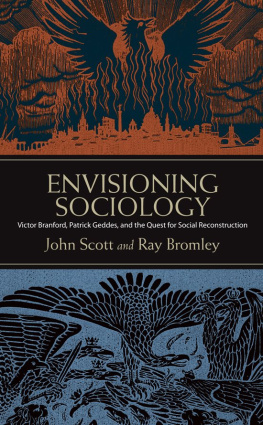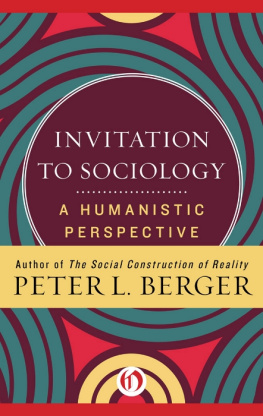
AN INVITATION TO THE SOCIOLOGY OF EMOTIONS
An Invitation to the Sociology of Emotions takes beginners as its primary audience and clearly and engagingly explains the theoretical concepts that animate the sociology of emotions. Harris relates this vibrant and growing field through explanation of its basic tenets, including emotion norms, emotion management, and emotional labor. With examples of current research, further reading suggestions, and exercises for students, this short text will spark student interest and prove an asset for instructors.
Scott R. Harris (Ph.D., University of Oregon) is Professor of Sociology at Saint Louis University, where he teaches courses on Emotions, Family, Research Methods, Social Psychology, and Contemporary Theory. He is the author of What Is Constructionism? (which received the Cooley Award from the Society for the Study of Symbolic Interaction) and How to Critique Journal Articles in the Social Sciences. He also co-edited (with Joel Best) Making Sense of Social Problems and co-authored (with Kerry Ferris) Stargazing: Celebrity, Fame, and Social Interaction. He currently serves as Editor-in-Chief of the journal Sociology Compass.
Finally! A textbook on the sociology of emotions conceptualized and written exclusively for an undergraduate audience. Scott Harris has filled an enormous gap with this accessible overview of the most interesting concepts, provocative findings, and latest research in the study of emotions. Replete with timely examples and infused with humor, students who accept Harris invitation will be richly rewarded for doing so!
John R. Mitrano, Sociology, Central Connecticut State University
With its clear writing and relevant everyday examples, An Invitation to the Sociology of Emotions is a highly accessible way for students to engage the core concepts from Hochschilds and others work. This concise textbook provides a sociology-of-emotions lens through which students can view the self, interaction, and society in a new light.
Jennifer Lois, Sociology, Western Washington University
Scott Harris has identified a problem facing anyone attempting to teachor learn aboutthe sociology of emotions: the lack of material aimed at beginners. An Invitation to the Sociology of Emotions solves that problem. Instructors and students alike will appreciate its clear presentation of concepts and theories, its accessible language, and its use of examples from recent research in the field.
Leslie Irvine, Sociology, University of Colorado, Boulder
Scott Harris gives a grand tour through the sociology of emotions, expertly engaging readers with fascinating topics, insightful theory, and pivotal foundations for understanding social interactions. With its welcoming and practical prose, An Invitation to the Sociology of Emotions will serve as a valuable resource for faculty and students.
Nancy Berns, Sociology, Drake University, and author of
Closure: The Rush to End Grief and What It Costs Us.
AN INVITATION TO THE SOCIOLOGY OF EMOTIONS
SCOTT R. HARRIS
First published 2015
by Routledge
711 Third Avenue, New York, NY 10017
and by Routledge
2 Park Square, Milton Park, Abingdon, Oxon, OX14 4RN
Routledge is an imprint of the Taylor & Francis Group, an informa business
2015 Taylor & Francis
The right of Scott R. Harris to be identified as author of this work has been asserted by him in accordance with sections 77 and 78 of the Copyright, Designs and Patents Act 1988.
All rights reserved. No part of this book may be reprinted or reproduced or utilised in any form or by any electronic, mechanical, or other means, now known or hereafter invented, including photocopying and recording, or in any information storage or retrieval system, without permission in writing from the publishers.
Trademark notice: Product or corporate names may be trademarks or registered trademarks, and are used only for identification and explanation without intent to infringe.
Library of Congress Cataloging in Publication Data
Harris, Scott R.
An invitation to the sociology of emotions / by Scott R. Harris. -- 1 Edition.
pages cm
Includes bibliographical references and index.
1. Emotions--Social aspects. 2. Social psychology. I. Title.
HM1033.H385 2015
302--dc23
2014048140
ISBN: 978-1-138-85499-4 (hbk)
ISBN: 978-1-138-85500-7 (pbk)
ISBN: 978-1-315-72062-3 (ebk)
Typeset in Adobe Caslon & Copperplate
by Fish Books Ltd.
FOR KAREN ANNE HARRIS
CONTENTS
PREFACE
This book presents a basic introduction to the Sociology of Emotions, a sub-field that was launched by Hochschilds (1983) groundbreaking book The Managed Heart. Like many instructors, I have frequently assigned The Managed Heart in class and have highly recommended it to others. Its a brilliant and provocative book, which has informed the work of hundreds of emotion scholars. On the other hand, it is challenging to read and becoming a bit dated.
Hochschild (understandably) wrote for other scholars first, and secondarily for lay and student readers. For example, her chapter on Paying Respects with Feeling skips right over the basics of exchange theory in order to discuss nuanced differences between improvised and straight exchanges. As a result, The Managed Heart serves researchers well but not entry-level audiences.
In contrast, An Invitation to the Sociology of Emotions takes beginners as its primary audience. My goal is to explain as clearly and engagingly as possible the theoretical concepts that animate The Managed Heart and the research it has inspired. I am tempted to describe my book as a Cliffs Notes version of Hochschilds book. That analogy is only partly correct though, as my book incorporates scores of examples and updates from research published in the intervening decades. Scholars of emotional labor have made important correctives and additions to Hochschilds argument. Moreover, I devote a full chapter to the topic of labeling emotions, a subject relegated to a short appendix in The Managed Heart.
Readers should note that my book is intended to be An Invitation and not An Introduction. In academic parlance, an introduction is usually a systematic summary, an elementary overview of a field that may span 300500 hundred pages. In contrast, an invitation is a request to take part in an activity. An invitation is meant to be enticing; it alludes to whats to come without giving it all away. That is the purpose of this bookto ignite students interest in the Sociology of Emotions. The scope is not comprehensive. The length is very short, and the price more affordable. However, instructors teaching an entire course on emotion will need to supplement this book with additional readings. Those who adopt the book as a supplement for other courses (such as Introduction to Sociology or Social Psychology) might or might not augment the book with a few articles, perhaps taken from the suggested readings at the end of each chapter.
In 2005, Turner and Stets published an impressive 350-page tome entitled The Sociology of Emotionsa more thorough summary of a wide range of perspectives on emotion. This book is an outstanding resource for researchers and graduate students. However, Turner and Stetss (2005, p. 317) goal was to encourage














